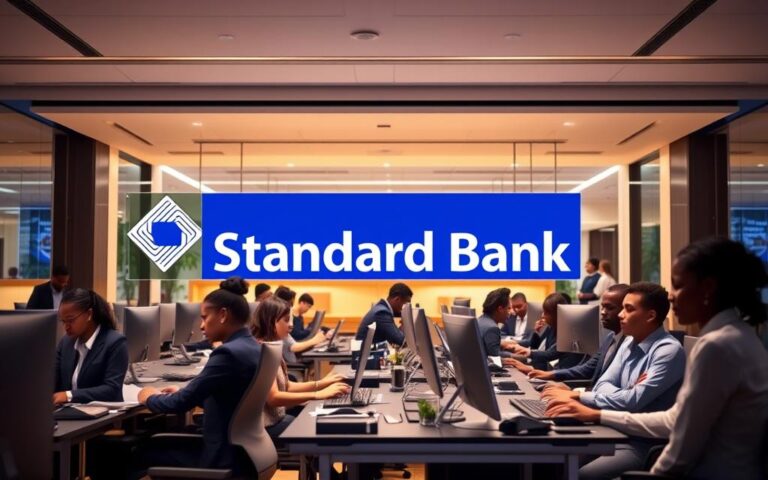Anúncios
Canada’s welding industry is booming. By 2030, skilled welding trades are set to grow by 25%. This creates exciting chances for immigrant welders in Canada’s thriving industrial scene.
The Canadian job market needs skilled welders in many areas. Construction, manufacturing, and energy sectors are all hiring. These jobs offer stable work and possible permanent residency for foreign workers.
Specialized welding skills are highly sought after in certain provinces. Alberta, British Columbia, and Ontario lead the pack. Welders with advanced certifications can fill crucial roles in these key regions.
Canada’s immigration policies make it appealing for global welding pros. The country values skilled trades development. Qualified international workers can build great careers here while boosting the economy.
Canadian industries are actively looking for talented welders with global experience. From aerospace to renewable energy, many fields need skilled workers. This offers a chance to work in a supportive, dynamic environment.
The Growing Demand for International Welders in Canada
Canada’s welding industry is transforming rapidly. This change creates exciting job opportunities for skilled welders from around the world. The market offers dynamic career paths in a thriving industrial sector.
International welders are becoming crucial in Canada. The country faces significant skills gaps in technical trades. Employers are actively seeking qualified welders for expanding infrastructure and industrial projects.
Current Industry Growth and Market Trends
Recent economic analyses show promising trends in Canada’s welding sector:
- Manufacturing sectors experiencing 4-6% annual growth
- Construction and energy industries expanding rapidly
- Infrastructure renewal creating substantial job opportunities
Skills Shortage in Canadian Welding Sector
The Canadian labor market faces a critical shortage of skilled welders. Projections indicate that approximately 20% of current welding positions remain unfilled. This presents an attractive opportunity for international workers.
“The demand for skilled welders in Canada has never been more promising for international talent.” – Canadian Welding Association

Impact of Infrastructure Projects on Welding Demand
Major infrastructure investments are driving high demand for welding professionals. Key projects in transportation, energy, and urban development require extensive welding expertise. These projects create numerous opportunities for foreign workers with specialized skills.
- National transportation infrastructure upgrades
- Renewable energy project expansions
- Urban infrastructure rehabilitation initiatives
Welding Jobs in Canada for Foreign Workers
Foreign welders can find exciting opportunities across multiple industries in Canada. Welding careers for non-residents are strong in construction, manufacturing, and energy development. These sectors actively seek skilled professionals who can meet high-quality standards.
The Canadian labor market offers robust welding job mobility for international experts. Employers look for experienced welders to contribute to critical infrastructure projects. These professionals must be able to adapt to Canadian work standards.
- Oil and Gas Industry: High-demand sector for specialized welding skills
- Construction Projects: Infrastructure development requires skilled welders
- Manufacturing Facilities: Continuous need for precision welding techniques
- Maritime and Shipbuilding: Specialized welding opportunities in coastal provinces
“Canada’s welding industry provides exceptional opportunities for skilled international workers willing to meet rigorous certification standards.” – Canadian Welding Bureau
Foreign welders must navigate work permits and immigration processes carefully. The most common pathways include:
- Temporary Foreign Worker Program
- Provincial Nominee Programs
- Express Entry skilled worker streams
| Province | Key Welding Sectors | Estimated Job Opportunities |
|---|---|---|
| Alberta | Oil Sands, Construction | 1,200-1,500 annually |
| Ontario | Manufacturing, Infrastructure | 1,500-2,000 annually |
| British Columbia | Shipbuilding, Energy | 800-1,100 annually |
Successful international welders must obtain proper certifications, demonstrate language proficiency, and understand Canadian safety regulations to maximize their employment prospects.
Essential Certifications and Qualifications
Canada’s skilled welding trades require specific certifications and professional standards. Foreign welders must meet certain qualifications to work in Canada. These ensure workplace safety and professional competence.
Red Seal Certification Requirements
The Red Seal Certification is the top credential for welders in Canada. Welders must complete specific steps to earn this prestigious certification.
- Complete a recognized apprenticeship program
- Pass a comprehensive national examination
- Demonstrate minimum work experience in skilled welding trades in Canada
- Provide proof of technical training and practical skills
Canadian Welding Bureau Standards
The Canadian Welding Bureau (CWB) sets high standards for welding professionals. Welders must meet several requirements to work in Canada.
- Obtain CWB certification for specific welding techniques
- Undergo regular skill assessments
- Maintain updated welding qualifications
“Professional certification is the passport to success in Canada’s welding immigration programs.” – Canadian Welding Association
Language Proficiency and Safety Training
International welders need to show they can speak English or French well. They must also meet other key requirements.
- IELTS or CELPIP language test scores
- Workplace safety certifications
- Technical communication skills relevant to welding trades
Welding immigration programs demand comprehensive preparation and commitment to professional excellence.
Top Provinces and Salary Expectations
Immigrant welders in Canada have exciting opportunities across several key provinces. Alberta, Ontario, and British Columbia offer the most welding jobs for foreign workers. These regions have strong industries that need skilled welders.
Alberta is a top destination for welding professionals. Its energy and construction sectors create steady demand for skilled welders. Oil sands projects and industrial development drive job opportunities in this province.
| Province | Average Annual Salary | Key Industries |
|---|---|---|
| Alberta | $65,000 – $85,000 | Oil & Gas, Construction |
| Ontario | $55,000 – $75,000 | Manufacturing, Automotive |
| British Columbia | $60,000 – $80,000 | Shipbuilding, Construction |
Ontario offers diverse welding jobs in manufacturing and automotive sectors. The province’s industrial centers provide stable employment with competitive salaries. Foreign workers can find many opportunities here.
- British Columbia presents unique welding opportunities in shipbuilding and marine industries
- Welders can expect higher wages in regions with significant industrial development
- Specialized certifications can increase earning potential
*Professional tip: Networking and obtaining Canadian welding certifications significantly improve job prospects for immigrant welders in Canada.*
Salary expectations vary based on experience, specialization, and industry demands. Welders with advanced skills and extra certifications can earn more. These factors affect wages across all provinces.
Conclusion
Canada offers great chances for skilled welders looking to grow their careers. Many provinces need welders for industrial and infrastructure work. This creates a promising path into the Canadian job market.
Welding immigration programs help foreign pros enter Canada’s strong manufacturing and construction sectors. These industries offer good pay, training, and clear paths for getting certified.
Welders must prepare well to work in Canada. Getting recognized certifications and improving language skills boost job chances. It’s smart to research each province’s rules and build professional connections.
Canada values skilled trade workers, making it welcoming for welders worldwide. Understanding local industries and keeping skills fresh are key. With the right approach, international welders can build lasting careers in this dynamic country.
FAQ
What qualifications do I need to work as a welder in Canada?
To work as a welder in Canada, you’ll need a Red Seal Certification. Foreign welders must have equivalent certifications and pass Canadian Welding Bureau standards. Safety training certificates and practical welding experience are crucial for work permits.
Which Canadian provinces offer the most welding job opportunities?
Alberta, Ontario, and British Columbia have high demand for welders. Alberta’s oil and gas industry leads in employment opportunities. Ontario’s manufacturing sector and British Columbia’s construction industries also offer significant job prospects.
How can foreign welders apply for jobs in Canada?
Foreign welders can apply through Work Permit Programs, Express Entry System, and Provincial Nominee Programs. First, obtain a job offer and get your credentials assessed. Then, apply for the appropriate work permit.
Websites like Job Bank Canada can connect international welders with Canadian employers.
What is the average salary for welders in Canada?
Welders in Canada earn between $45,000 and $85,000 annually, depending on experience and location. Specialized welders in oil, gas, or aerospace can earn even higher wages.
Overtime, certifications, and technical skills can significantly impact earning potential.
Do I need to speak English or French to work as a welder in Canada?
Yes, language proficiency is essential. Most employers require at least intermediate-level English or French. You’ll need to provide language test results like IELTS or TEF.
Some provinces may have specific language requirements for skilled trades.
What types of welding certifications are recognized in Canada?
Canada recognizes Canadian Welding Bureau (CWB) certifications, Red Seal Certification, and international certifications from recognized institutions. Common certifications include Structural Steel, Pipe, and Pressure Vessel Welding.
Foreign welders may need additional training or exams to validate their existing certifications.
Are there specific immigration programs for skilled welders?
Several programs support skilled welders, including the Federal Skilled Trades Program and Provincial Nominee Programs. These help welders immigrate to Canada permanently.
Each program has specific requirements for work experience, language skills, and educational qualifications.





